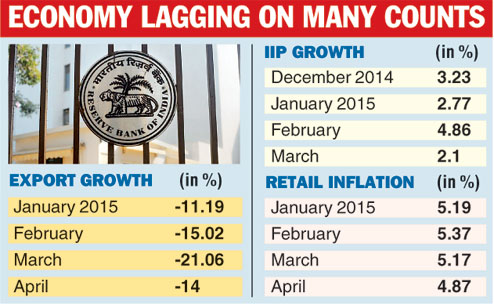Mumbai, Nov. 27: The Reserve Bank of India's surprise move on Saturday to absorb the extra liquidity in the banking system may have an adverse impact on markets with yields on government securities projected to inch up and banking stocks coming under pressure.

Banks have seen a surge in deposits after the Union government scrapped old Rs 500 and Rs 1,000 notes. The lenders have received more than Rs 5 trillion in deposits till November 18.
With credit growing at a tardy pace, banks have been investing in government securities or parking their excess funds at the central bank's reverse-repo window. This caused yields on the benchmark 10-year security to dip by around 50 basis points.
Yesterday, the RBI said banks had to maintain an incremental cash reserve ratio (CRR) of 100 per cent for the increase in deposits between September 16 and November 11. CRR is that portion of bank deposits which must be maintained with the RBI. Banks have to usually maintain four per cent of their deposits as CRR with the RBI. However, according to this temporary measure, they will have their entire extra deposits during this period with the RBI, estimated at over Rs 3 trillion.
"This is intended to absorb part of the surplus liquidity arising from the return of specified bank notes (SBNs) to the banking system, while leaving adequate liquidity with banks to meet the credit needs of the productive sectors of the economy. As the incremental CRR is intended to be a temporary measure within the Reserve Bank's liquidity management framework to drain the excess liquidity in the system, it shall be reviewed on December 9 or even earlier," the RBI said in a statement.
Market experts said the move could puncture the rally in government security prices and even temper expectations of a lending rate cut by banks.
Following the Centre's move, a few banks have reduced their deposit rates fuelling hopes of a cut in benchmark lending rates.

"We could see a 10-20 basis point jump in yields as trading resumes tomorrow. If the deposit momentum continues, one cannot rule out further liquidity tightening measures by the RBI," a senior official from a private bank said.
One of the reasons behind the RBI move could be that it was running short of securities in the reverse-repo window.
Banks deposit excess cash in this window against securities tendered by the RBI.
"Banks have parked a record Rs 4.3 trillion with the RBI as of November 22 against which they receive government securities. However, RBI's G-sec holding currently stands at around Rs 7 trillion, which may compel the central bank to look for alternatives to sterilise the liquidity in the near-term... The average amount that banks have been parking with the RBI since November 9 is Rs 1.75 trillion compared with the last three months' average of Rs 25,600 crore (pre-demonetisation)," India Ratings said in a report.











